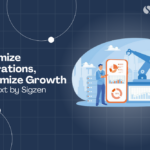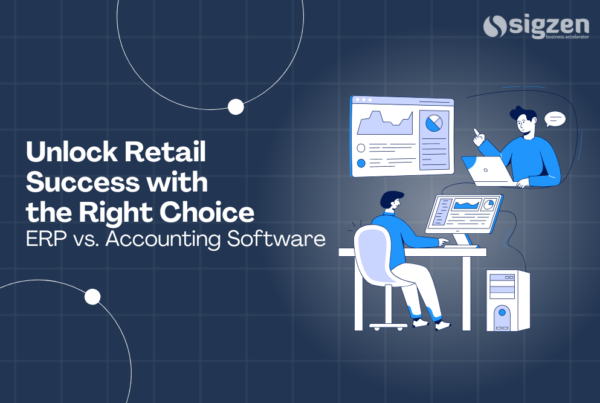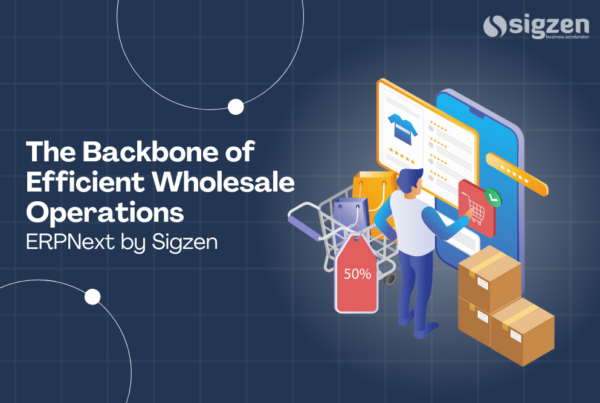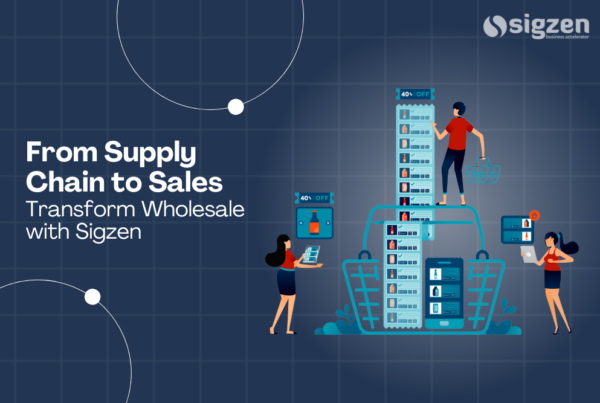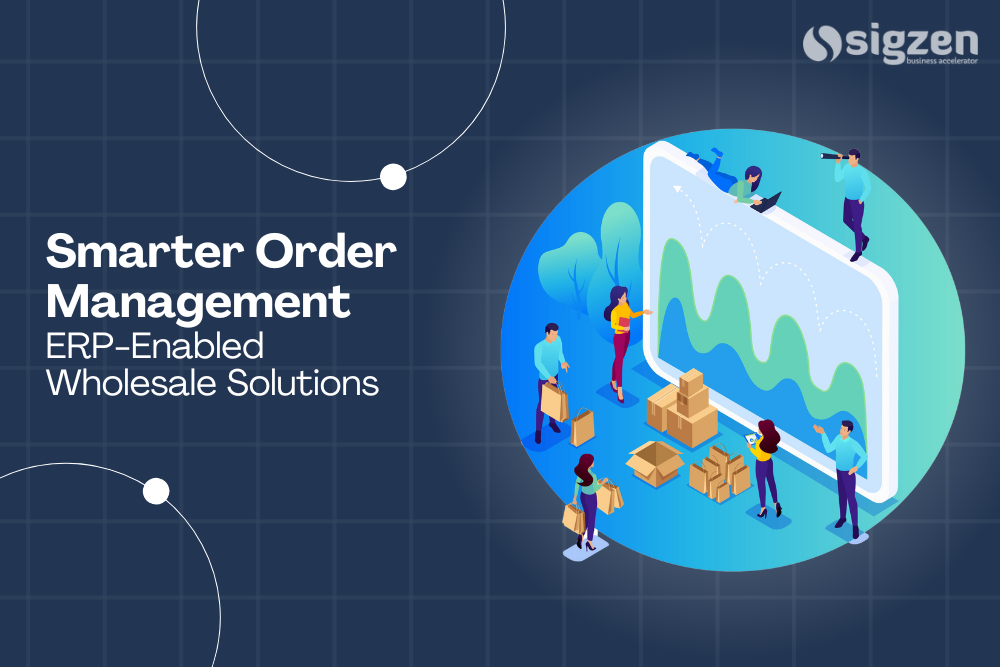
Introduction: Transforming Wholesale Sales and Order Management with ERP
Wholesale businesses thrive on efficiency, accuracy, and rapid fulfillment. However, managing sales and orders with traditional methods often leads to delayed deliveries, mismanaged inventory, and unsatisfied customers. Implementing an ERP for sales and order management is the game-changing solution wholesale businesses need to streamline operations and achieve scalable growth.
ERP (Enterprise Resource Planning) software centralizes and automates every aspect of sales and order management, ensuring seamless coordination between teams, improved customer satisfaction, and optimized inventory. This article explores the transformative impact of ERP systems on sales and order management for wholesale businesses and highlights how these solutions drive operational excellence.
Why Sales and Order Management is Critical for Wholesale Success
1. High Volume Transactions
Wholesale businesses handle bulk orders that demand real-time visibility into inventory and smooth processing.
2. Complex Pricing Structures
Negotiated contracts, volume discounts, and tiered pricing require precise tracking to avoid revenue loss.
3. Customer Expectations
In today’s competitive landscape, customers expect accurate, fast, and flexible order fulfillment.
4. Inventory Challenges
Managing stock levels to prevent overstocking or stockouts while maintaining operational efficiency is a constant struggle.
5. Regulatory Compliance
Accurate invoicing and adherence to tax regulations, especially for large transactions, are critical for avoiding penalties.
How ERP Software Streamlines Sales and Order Management
1. Centralized Sales and Order Tracking
An ERP system integrates all sales-related activities into one platform, offering real-time visibility into orders, inventory, and customer data. Benefits include:
- Automated Order Processing: Reduce manual errors and ensure timely order fulfillment.
- Real-Time Updates: Track order status, from placement to delivery.
- Customer Relationship Management (CRM): Maintain detailed records of customer interactions, preferences, and buying history.
Discover ERPNext’s Sales Cycle features for more insights.
2. Optimized Inventory Management
ERP systems connect sales and inventory, enabling businesses to maintain optimal stock levels. Key features include:
- Real-Time Inventory Tracking: Monitor stock levels and availability across multiple warehouses.
- Automated Reorder Points: Set thresholds to replenish stock before it runs out.
- Batch and Lot Tracking: Ensure accurate fulfillment of specific product variations.
Learn more about inventory management features here.
3. Pricing and Discount Automation
Managing diverse pricing structures manually is prone to errors. ERP systems simplify this with:
- Dynamic Pricing Models: Automatically apply tiered pricing, volume discounts, or promotional rates.
- Contract Management: Ensure agreed-upon pricing terms are accurately reflected in invoices.
- Customer-Specific Discounts: Tailor pricing strategies for key accounts to drive loyalty.
4. Faster and Accurate Invoicing
Manual invoicing can lead to delays and errors. ERP systems ensure:
- Automated Invoice Generation: Create accurate invoices immediately after order confirmation.
- Integration with Payment Systems: Streamline payments with online and offline options.
- Tax Compliance: Automate GST, VAT, and other tax calculations to meet regulatory requirements.
5. Reporting and Analytics
ERP systems provide detailed insights into sales performance and order trends. Key benefits include:
- Customizable Dashboards: Monitor key metrics such as sales revenue, customer acquisition, and average order value.
- Forecasting Tools: Predict demand trends to optimize inventory and plan promotions.
- Profitability Analysis: Evaluate customer and product profitability to refine sales strategies.
Key Features of ERP for Sales and Order Management
1. Integrated CRM
An ERP system with built-in CRM ensures:
- Centralized customer data for personalized sales approaches.
- Automated follow-ups to improve conversion rates.
- Detailed customer insights for targeted marketing campaigns.
2. Multi-Channel Order Management
ERP systems consolidate orders from multiple sales channels (e.g., online stores, retail partners, and direct sales) into one platform.
3. Inventory Sync Across Locations
Track inventory in real time across multiple warehouses and outlets, ensuring accurate order fulfillment.
4. Workflow Automation
From quote generation to order delivery, automate repetitive tasks to save time and reduce human error.
5. Mobile Accessibility
Enable sales teams to access ERP features on the go, improving responsiveness and decision-making.
Benefits of ERP for Wholesale Sales and Order Management
1. Enhanced Operational Efficiency
Automation of sales and order processes reduces manual errors and speeds up workflows.
2. Better Customer Experience
Fast and accurate order fulfillment leads to improved customer satisfaction and loyalty.
3. Cost Savings
ERP systems optimize inventory management, reduce wastage, and lower administrative costs.
4. Improved Scalability
Support business growth with ERP solutions that can handle increasing sales volumes and complex operations.
5. Data-Driven Decision Making
Access real-time analytics and reports to refine sales strategies and identify growth opportunities.
Real-World Example: How ERP Transformed a Wholesale Business
Challenge: A mid-sized wholesale business faced challenges with manual order processing, inventory mismanagement, and pricing inconsistencies.
Solution: After implementing Sigzen’s ERP solution, the business achieved:
- 30% faster order fulfillment due to automated workflows.
- 25% reduction in inventory holding costs through real-time stock tracking.
- Improved customer satisfaction with accurate pricing and on-time deliveries.
Learn more about Sigzen’s ERP solutions for wholesale businesses.
ERP for Sales and Order Management: Best Practices
1. Define Clear Objectives
Identify specific pain points, such as order delays or pricing errors, to ensure the ERP system addresses your key challenges.
2. Train Your Team
Provide comprehensive training to ensure all employees understand and use the ERP system effectively.
3. Monitor KPIs
Regularly track key performance indicators like order accuracy, customer retention, and inventory turnover to measure ERP effectiveness.
4. Choose the Right Vendor
Partner with experienced providers like Sigzen to ensure smooth implementation and ongoing support.
Choosing the Best ERP for Wholesale Sales and Management
When selecting an ERP solution for wholesale businesses, consider the following:
- Customizability: Ensure the system supports your unique sales and order processes.
- Scalability: Choose software that can grow with your business.
- User-Friendliness: Opt for intuitive interfaces to ensure quick adoption by your team.
- Integration Capabilities: Ensure seamless integration with existing tools like accounting and CRM systems.
Request a demo from Sigzen to explore tailored ERP solutions for wholesale businesses.
Addressing Common Concerns About ERP Implementation
1. Is ERP Expensive?
While ERP systems require an initial investment, the long-term benefits of improved efficiency, cost savings, and increased revenue justify the expense.
2. How Long Does Implementation Take?
Implementation timelines vary depending on business complexity but can typically range from a few weeks to a few months.
3. Is ERP Secure?
Modern ERP systems employ robust security measures, including data encryption and role-based access, to protect sensitive business information.
Conclusion: Elevate Wholesale Efficiency with ERP for Sales and Order Management
Managing sales and orders effectively is the backbone of any successful wholesale business. Implementing an ERP for sales and order management not only streamlines processes but also enhances customer satisfaction, reduces costs, and boosts revenue. By choosing tailored solutions like those offered by Sigzen, wholesale businesses can achieve unparalleled efficiency and scalability.
Ready to transform your wholesale business? Request a demo from Sigzen today!
